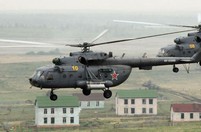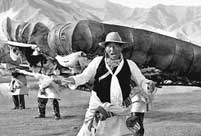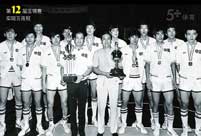 Chinese Air Force's combat group organizes actual-combat training
Chinese Air Force's combat group organizes actual-combat training Owner ordered to demolish building
Owner ordered to demolish building
 'Zombies' haunt Kaohsiung MRT
'Zombies' haunt Kaohsiung MRT
 How do politicians and royal families spend holidays?
How do politicians and royal families spend holidays?
 Collective wedding ceremony for 'Beijing drifters’ held in Happy Valley
Collective wedding ceremony for 'Beijing drifters’ held in Happy Valley
 Chinese characters tattoos: be careful to choose the right characters!
Chinese characters tattoos: be careful to choose the right characters!
 India launches first indigenous aircraft carrier
India launches first indigenous aircraft carrier
 Questioning China's real achievements
Questioning China's real achievements
 Xinhua sports photo of week (Aug. 5- Aug. 11)
Xinhua sports photo of week (Aug. 5- Aug. 11)In The Grandmaster, Wong seeks to capture the nobility and formality of Chinese kung fu as it existed in the 1930s and '40s, as well as today with its competing schools, traditions and philosophies.
The director says he considered naming the film The Grandmasters, but his son talked him out of it, arguing that the film was more about the idea of what it takes to be a grandmaster than the grandmasters themselves.
Wong says he wanted to set the record straight on the Ip Man story, as opposed to merely dazzling audiences with another kung fu movie. The original rendition of the Ip Man saga in cinematic form was released as a semi-biographical story in 2008, which was followed by Ip Man 2 in 2010.
Wong spent 22 months on a budget of $25 million to shoot the film.
Wong missed a number of release dates before The Grandmaster finally reached theaters on the Chinese mainland in January. The film is Wong's greatest commercial success to date, having earned more than $50 million worldwide. In China, it out-grossed his previous four features combined.
"To make this film is like a dream come true," Wong says. "I grew up on streets full of martial arts schools, but I was never allowed to practice martial arts."
When he was growing up, he says, martial arts schools were dark and mysterious and sometimes associated with the triad gangs - groups that became prevalent in Hong Kong during the 1960s and '70s. No parent would encourage their child to practice martial arts, says Wong.
At the end of the film, a boy stares intently through the window at Ip Man's martial arts studio.
"That could be Bruce Lee or that could be me because it was always my dream to walk through the door to find out what's so special, what's so mysterious about Chinese martial arts," Wong says. "With this film, I walked past this door and I find it very satisfying."
 |
 Helicopters, tanks seen during China-Russia joint drill
Helicopters, tanks seen during China-Russia joint drill Conjoined twins separated in groundbreaking surgery
Conjoined twins separated in groundbreaking surgery Junpa village: The only fishing village in Tibet
Junpa village: The only fishing village in Tibet Argentina's president voices support of ruling party
Argentina's president voices support of ruling party 3D painting, new way to promote apartment sale
3D painting, new way to promote apartment sale Review: Asian Men's Basketball Championship
Review: Asian Men's Basketball Championship Air Force's combat group conducts flight training in joint drills
Air Force's combat group conducts flight training in joint drills Lightning causes fire in refinery in Venezuela
Lightning causes fire in refinery in Venezuela Various sun protective outfits
Various sun protective outfits Top 10 most dangerous jobs in the world
Top 10 most dangerous jobs in the world Snapshots of 14th IAAF Athletics Championships Moscow 2013
Snapshots of 14th IAAF Athletics Championships Moscow 2013 Geomancy city Ganzhou
Geomancy city GanzhouDay|Week|Month